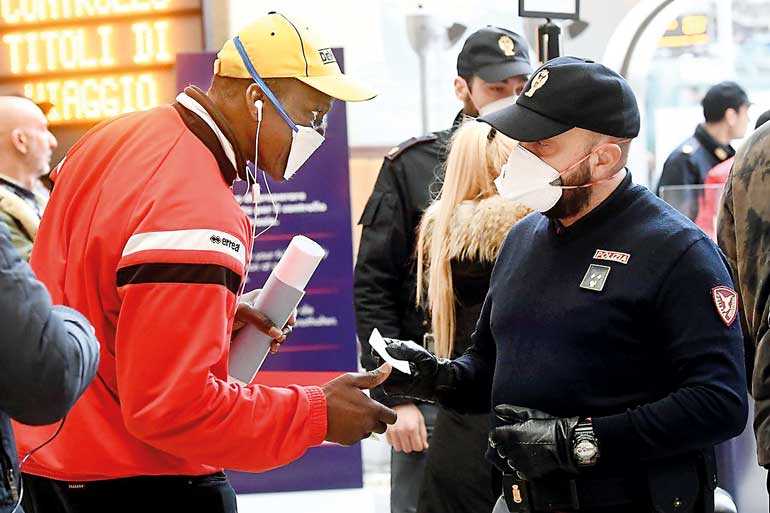Monday Feb 23, 2026
Monday Feb 23, 2026
Tuesday, 10 March 2020 00:00 - - {{hitsCtrl.values.hits}}

Police officers wearing protective masks make checks on people at Milan's main train station following a government decree that has shut down large areas in the north of the country, to stem coronavirus contagion - Reuters
ROME (Reuters): Italy’s prime minister promised “massive shock therapy” to beat the coronavirus yesterday and urged Europe to act decisively after markets plunged and his country sealed off much of its wealthy industrial north.
France echoed Giuseppe Conte’s call for action, saying Europe must come up with a “strong, massive and coordinated response” and euro zone finance ministers, meeting next week, must decide on a stimulus plan to avoid economic crisis.
Stocks have fallen worldwide as the virus has spread, cutting global supply lines and crippling industry.
They plummeted again yesterday as prices for crude oil tumbled as much as 33% after Saudi Arabia launched a price war with Russia, sending investors already worried by the coronavirus fleeing for the safety of bonds and the Japanese yen.
US stock futures fell 5% to hit their daily lower limit and halt trading. London’s FTSE 100 shed 8.4% a few minutes after the open in its worst single-day drop since the financial crisis.
In little more than two weeks, the number of recorded coronavirus cases in Italy has surged to 7,375, with 366 deaths, the second-highest death toll after China, putting the health system under huge strain.
“We will not stop here,” Conte told the daily La Repubblica. “We will use a massive shock therapy. To come out of this emergency we will use all human and economic resources.”
He said strict European Union borrowing limits should be loosened to allow more fiscal room for maneuver, and that the flexibility envisaged by the EU’s budget rules should be used “in full”.
“Europe cannot think of confronting an extraordinary situation with ordinary measures,” he said.
The virus emerged in China in December but has since spread around the world. Flights have been canceled, communities from cities to cruise liners have been isolated, and concerts, trade fairs and sporting events postponed. Even the Tokyo Summer Olympics are in doubt.
More than 110,000 people have been infected in 105 countries and territories and 3,800 have died, the vast majority in mainland China, according to a Reuters tally.
With Italy’s economy already on the brink of recession, its new curbs, unprecedented in Italy’s post-war history, halt movement in and out of Lombardy, which is the richest and most economically productive region and includes Milan, and close many public spaces.
Bars and restaurants were ordered to close or to restrict entry and maintain a distance of at least a meter between people on their premises. Major sporting events, including top-flight Serie A football, will be played without spectators for a month. France had 1,126 confirmed coronavirus cases and 19 deaths as of Sunday evening. The Central Bank estimated the economy would barely grow in the first quarter from the previous three months and warned of a potentially severe slowdown.
But China and South Korea, Asia’s second-worst hit country, have both reported a slowdown in new infections.
Mainland China, outside the epicenter of Hubei province, reported no new locally transmitted coronavirus cases for the second day yesterday, but a top Communist Party official warned against reducing vigilance.
The Korea Centers for Disease Control and Prevention yesterday reported 165 new coronavirus cases in South Korea, bringing the national tally to 7,478, while the death toll rose by one to 51.
The rate of increase in new infections fell to its lowest level in 11 days, prompting President Moon Jae-in to say South Korea can enter the “phase of stability” soon if it continues to reduce the number of new cases.
Iran, with 7,161 cases and 237 deaths, the third highest toll after China and Italy, released about 70,000 prisoners because of the coronavirus, judiciary chief Ebrahim Raisi said yesterday, according to Mizan, the news site of the Judiciary.
“The release of the prisoners, to the point where it doesn’t create insecurity in society ... will continue,”
he said.